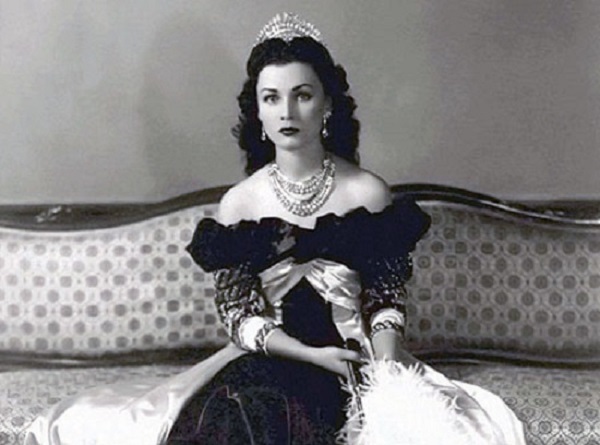العربية

Learn the story of a movie that threatened to break off Princess Fawzia's engagement
Stars News Tue, Nov 21, 2023
November 5 marks the centenary of the birth of Princess Fawzia, daughter of King Fouad I and Queen Nazli, and sister of King Farouk. She was born in 1921 in Ras El-Tin Palace in Alexandria. She was called “the most beautiful women on earth.” She is an Egyptian princess descended from the Muhammad Ali dynasty, and later became the Empress of Iran after marrying the Crown Prince of Iran, Muhammad Reza Pahlavi, who became the Shah in 1941.
Princess Fawzia and Muhammad Reza Pahlavi got engaged in May 1938, and they were married in a legendary wedding that lasted three consecutive days at Abdeen Palace in Cairo on March 15, 1939. Before the marriage was consummated, the Crown Prince almost broke off his engagement to Princess Fawzia because of an Egyptian movie called “Laila Daughter of the Desert.” “. What is the story of the movie? Why did it cause a political crisis between Egypt and Iran?
The crisis occurred when the film “Laila Daughter of the Desert,” written by Mahmoud Hamdi, directed by Mario Volpe, and starring Bahija Hafez, Hussein Riad, Zaki Rustom, Abbas Fares, and Raqia Ibrahim, was screened on January 28, 1937. A year after its first showing, the Iranian government sent an official protest against the screening of the film. Considering that it insults the history of the ancient Persian king, Khosrau Anushirwan. The events of the film revolve around the war between the Persians and the Arabs, and it tells the story of “Laila,” who was captured by the Persian king and forced her to confess herself. When she refused, he tortured her, so she sang a poem in which she said: “They beat me to the place of chastity,” which is the sentence that caused the crisis.
The Iranian ambassador to Egypt, Muhammad Ali Jam, made contacts with the Egyptian Royal Palace to prevent the film. King Farouk personally issued an order to stop showing the film, confiscate it, and investigate the film’s heroine and producer, Bahija Hafez. This is the decision that caused Bahija's bankruptcy, and she tried through her connections to re-screen the film, but the Ministry of the Interior refused, and Bahija was subjected to a bargain, as the Ministry of Interior stipulated that some amendments be made to the film and that all scenes that insulted the King of Persia be deleted, in exchange for agreeing to show it again.
The Iranian ambassador to Egypt, Muhammad Ali Jam, made contacts with the Egyptian Royal Palace to prevent the film. King Farouk personally issued an order to stop showing the film, confiscate it, and investigate the film’s heroine and producer, Bahija Hafez. This is the decision that caused Bahija's bankruptcy, and she tried through her connections to re-screen the film, but the Ministry of the Interior refused, and Bahija was subjected to a bargain, as the Ministry of Interior stipulated that some amendments be made to the film and that all scenes that insulted the King of Persia be deleted, in exchange for agreeing to show it again.
Bahija Hafez rejected the amendments and justified her refusal by saying that the Egyptian censorship had approved the film before and after it was filmed. She resorted to the courts, insisting on her right to show the film, and filed a compensation lawsuit against the government, demanding compensation amounting to 20 thousand pounds. The case remained before the courts for 6 years. Until some changes occurred in the political arena, as relations between Egypt and Iran became tense after Queen Fawzia left Iran and returned to Cairo in May 1945. She refused to travel again to Iran, and asked her brother, King Farouk, to separate from her husband, in order to obtain a divorce from the King of Iran, Muhammad Reza Balhawi. On November 17, 1948.
At that time, Bahija Hafez had complied with the authority’s orders and agreed to show the film after making some modifications to it and deleting the offensive scenes. She also changed the name of the film to “Bedouin Laila.” The film was re-screened again on March 12, 1944 and failed miserably. Despite its winning a gold award at the Berlin International Film Festival and the film’s praise among art critics and on the pages of newspapers and magazines, the interference of the authorities led to the film’s collapse. The authority tried to compensate Bahija Hafez for her loss, giving her 3,000 pounds, at a time when her losses reached 45,000 pounds.
Picture 6
As for Princess Fawzia, she regained her characteristics as an Egyptian princess after her return to Egypt. On March 28, 1949, she married Colonel Ismail Sherine, who was the last Minister of War and Navy in Egypt before the revolution of July 23, 1955. After the revolution, Princess Fawzia’s money was confiscated and she was stripped of her royal titles, and she remained residing in Alexandria until she died on July 2, 2013 at the age of She was 91 years old and was buried in Cairo next to her husband, who died in 1994.

